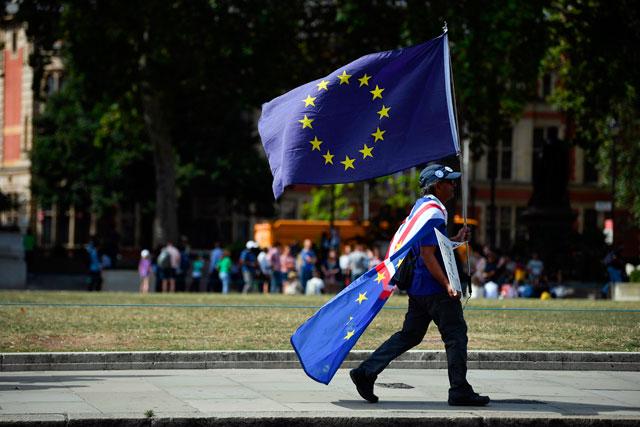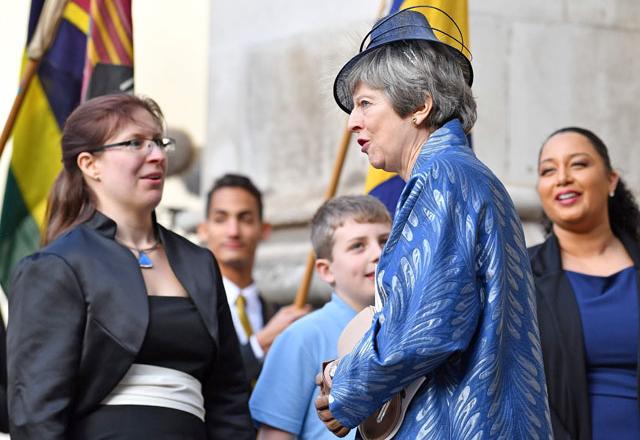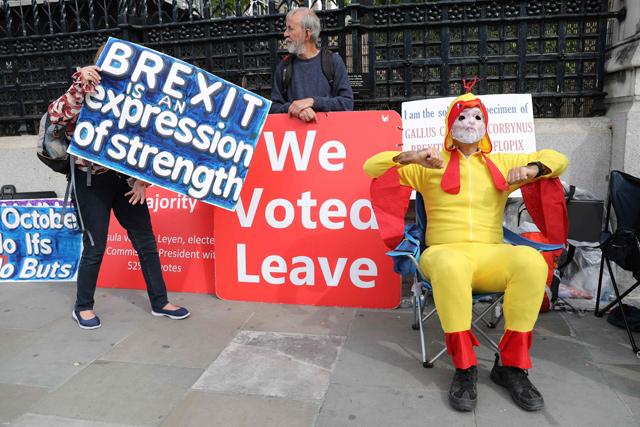You are here
No-deal, prorogue and BOBs: A Brexit glossary
By AFP - Aug 29,2019 - Last updated at Aug 29,2019

An anti-Brexit protester with an EU flag walks outside the Houses of Parliament in Westminster, London, on Thursday (AFP photo)
LONDON — Britain’s long goodbye to the European Union often seems to be spoken in unintelligible code.
Most know the process as Brexit — a child of the term Grexit that was coined by economists when it looked like debt-laden Greece would exit the eurozone in 2012.
Greece stuck around but Britain is leaving the EU due to a 2016 referendum that soon spawned its own lexicon.
Here is a look at some of the terms — both real and invented — politicians and pundits are using to describe a split that is currently scheduled to happen on October 31.
Article 50
The basics begin with the 2007 Lisbon Treaty that updated the bloc’s governing rules.
Its Article 50 provides a “withdrawal clause” — a two-year notice that then prime minister Theresa May sent to European Council president Donald Tusk in 2017.
The negotiating period ran out on March 29 this year but that deadline has been extended twice by the EU.
Any further postponement would require the agreement of both the British prime minister and the other 27 EU leaders.
Withdrawal Agreement
Britain and its 27 EU partner states crowned nearly two years of mind-numbingly complex negotiations by putting their names in December 2018 to a 585-page tome spelling out the legal fine print of the divorce.
Fuming UK lawmakers promptly voted against it by a historic margin on January 15 and twice more in subsequent votes in parliament.
Backstop
The biggest bone of contention between London and Brussels is a series of provisions in the draft agreement on what to do about the Irish border.
Brexit creates an EU frontier between bloc member Ireland and Britain’s Northern Ireland.
But the troubled province is governed by a 1998 peace agreement that removed a physical border between Ireland and the North.
The “backstop” tries to get around this — and keep the peace — by making all of Britain part of the customs union until a new EU-UK trade deal is reached.
Northern Ireland would additionally adopt single market provisions to allow free-flowing trade of, for example, live animals.
No-deal Brexit
Prime Minister Boris Johnson has said he is aiming to replace the backstop in the deal with unspecified “alternative arrangements”.
Failing that, he is willing to lead Britain out of the European Union after 46 years without an overall divorce agreement with Brussels.
The government’s own assessment warns about potential food, fuel and medicine shortages if this happens and experts say that the economy will take a hit.
Some agreements with Brussels — for example to keep planes flying between Britain and the EU — are in place even in case of a no-deal Brexit.
But significant disruption is still expected and it would leave many questions unresolved — not least the status of Britons living in the EU and EU citizens in Britain.
Prorogue
Proroguing is the procedure by which Queen Elizabeth II officially suspends parliament at the end of a legislative session on the advice of the government.
It usually happens every year without controversy but the procedure was used in a particularly contested way on Wednesday when Johnson asked the Queen for a suspension.
This will limit the time for no-deal Brexit opponents to try to legislate against it or to mount a successful challenge against Johnson’s government.
BOBs
Many Britons are bored of Brexit — or BOB — and want the whole thing to simply go away.
The acronym struck a nerve in a tired nation that has been debating the same points about Brexit for the best part of three years.
BOBs are also prone to use the #brexitshambles hashtag on Twitter.
By Dario Thunburn
Related Articles
BRUSSELS — A Brexit deal seemed close on Saturday after the EU indicated legal ways for Britain to unilaterally leave the contentious Irish
LONDON/HELSINKI — The Finnish EU presidency on Thursday demanded Britain deliver a written proposal by the end of September on leaving the E
BRUSSELS — Whether or not the British parliament legislates to block a no-deal Brexit, a reluctant Boris Johnson would still have to make an













